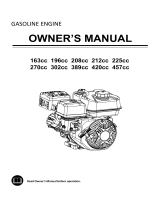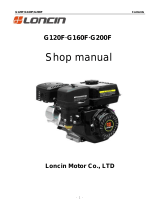
CHECK BEFORE OPERATION
6
4. CHECK BEFORE OPERATION
IS YOUR ENGINE READY TO GO?
For your safety, and to maximize the service life of your equipment, it is very important to
take a few moments before you operate the engine to check its condition. Be sure to take
care of any problem you find, or have your servicing dealer correct it, before you operate
the engine.
Improperly maintaining this engine,
or failing to correct a problem
before operation, could cause a
malfunction in which you could be
seriously injured.
Always perform a preoperation
inspection before each operation,
and correct any problem.
Before beginning your preoperation checks, be sure the engine is level and the engine
switch is in the OFF position.
Check the General Condition of the Engine
z Look around and underneath the engine for signs of oil or gasoline leaks.
z Remove any excessive dirt or debris, especially around the muffler and recoil starter.
z Look for signs of damage.
z Check that all shields and covers are in place, and all nuts, bolts, and screws are
tightened.
Check the Engine
Check the engine oil level. Running the engine with a low oil level can cause engine
damage.
The Oil Alert system (applicable engine types) will automatically stop the engine before the
oil level falls below safe limits. However, to avoid the inconvenience of an unexpected
shutdown, always check the engine oil level before startup.
Check the air filter. A dirty air filter will restrict air flow to the carburetor, reducing engine
performance.
Check the fuel level. Starting with a full tank will help to eliminate or reduce operating
interruptions for refueling.
Check the Equipment Powered by This Engine
Review the instructions provided with the equipment powered by this engine for any
precautions and procedures that should be followed before engine startup.
























